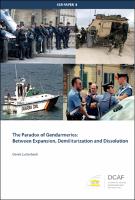The Paradox of Gendarmeries
Between Expansion, Demilitarization and Dissolution
Abstract
This paper describes and explains the evolution of gendarmerie-type forces, i.e. police forces with a military status, over the past three decades. It focuses on their institutional features and functions, including material and human resources, and uses case studies from Europe, the Middle East and North Africa to illustrate these characteristics in different contexts. The overall development of gendarmeries has been a somewhat paradoxical one. On the one hand, most of these forces have witnessed a considerable expansion, and come to assume an increasingly prominent role in addressing many of the currently most important security challenges, ranging from border control and counterterrorism to public order tasks in international peace operations. On the other hand, there has also been a trend towards the demilitarization of gendarmeries, which in some European countries has ultimately led to their dissolution and integration into the civilian police. The paper suggests an explanation of these seemingly contradictory developments with reference to two broad â and at least partly opposing â trends: the convergence of internal and external security agendas, which to a large extent is a post-Cold War phenomenon; and the demilitarization of internal security, which is a more long-term historical trend and part of the more general democratization process. Based on this analysis, the paper predicts that in the long run gendarmeries are likely to be further demilitarized, eventually losing their formal military status, although in the context of international peace operations militarized gendarmerie forces are expected to play an increasingly significant part.
Keywords
security sector reform; good governance; gendarmerie; police; paramilitaryDOI
10.5334/bbsISBN
9781911529354OCN
1100489802Publisher
Ubiquity PressPublisher website
https://www.ubiquitypress.com/Publication date and place
London, 2013Series
SSR Papers, 8Classification
Politics and government
Warfare and defence


 Download
Download